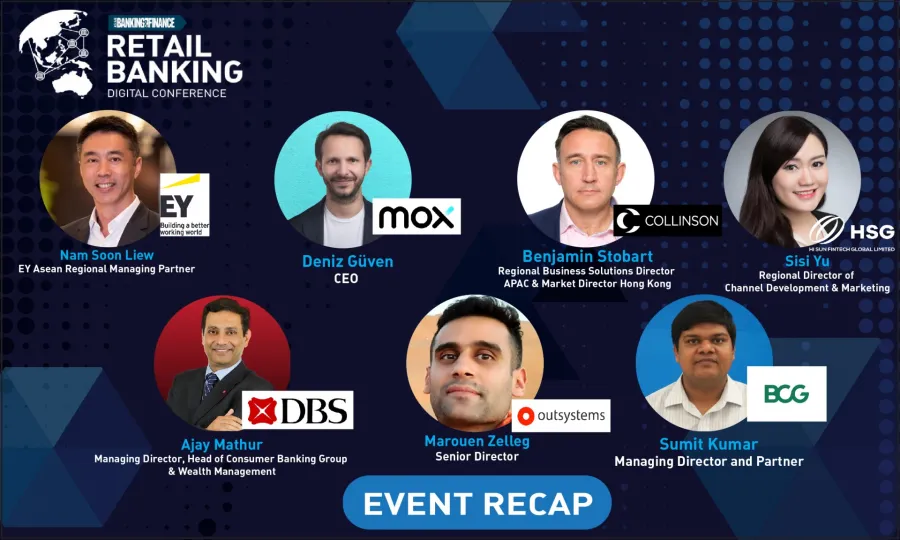
DBS, EY, Mox and more share how data, digital shape the future of banking
Over a hundred banking and finance professionals attended the ABF Retail Banking Digital Conference.
In building a resilient, future-proof bank, leaders must seek ways to drive insights and be open to cooperation—even with their new-age competitors.
Finance leaders and industry experts discussed ways on how banks can drive and use data-driven insights in order to thrive in the era of digital disruption during the ABF Retail Banking Digital Conference hosted by Asian Banking & Finance on 22 April.
Over a hundred attendees from all over Asia participated in the event.
The past few months saw the use of digital banking and financial transactions surge, pushing the region closer to a cashless economy.
A surge in the use of digital for financial transactions was observed, pushing the region closer to a cashless economy. This trend is expected to continue amidst an era of innovation in cross-border remittances, lending to underserved segments such as small and medium enterprises (SMEs), and people refused by traditional banks, says EY regional managing partner for ASEAN Nam Soon Liew, in his opening forum that gave the attendees a rundown of trends and updates in the region’s digital banking space.
Amidst tough competition, lenders and financial players who effectively use tech to refine their offerings will be the ones to clinch clients—especially at a time when the plethora of options meant that individuals have become pickier with their expectations.
“Customers demand better user experience, lower fees and higher returns. This segment is traditionally served by the incumbent banks. But now, digital banks and insurers are targeting this segment, and fintechs and big tech are also addressing specific pain points,” Liew further noted.
Incumbent banks are not standing still, however, with the leading banks embarking on acquisitions and strategic partnerships. “We are now seeing incumbents do the same and move beyond just digital transformation efforts. This competition is therefore driving greater value and choice to customers,” Liew added.
Driving digital transformation is especially important, given that for the newer generation— notably the millennials—banking through a mobile platform or through the web is the default, says Marouen Zelleg, senior director at Outsystems.
But building a modern web or mobile application has its own challenges, especially for organizations with an aging backend system, and little to no mastery of a customer experience-driven design, warns Zelleg.
In his presentation, he identified two key problems that banks usually face in their apps and digital platforms: the first is the struggle to maintain and improve a single digital channel, mobile app, and even website, primarily blamed on their backend website not being well integrated into their back office. Competitors and banks who successfully conquered this challenge to become leaders in the digital banking and financing field all have one common recipe: their businesses’ stakeholders agenda is very well aligned with their IT capabilities.
However, building a strong IT team presents the second key challenge for banks, given the shortage of talent pool.
Zelleg suggested building a local platform will abstract the technology complexity, and automate the mundane development and deployment tasks.
“This way, the IT team can focus on delivering business value and business functionality,” he added.
Utilizing, understanding data
The next step for banks, after strengthening their digital offerings and establishing a strong IT team, is to be able to understand how to utilize data and analytics in order to monetize opportunities. And this is an endeavor in which a lot of incumbents still struggle, according to Sumit Kumar, managing director and partner, Boston Consulting Group (BCG).
“As I talk to my banking clients, the first thing they say is, “look, we have all the data, we have all the models, but we get no value.” And this is a common tone amongst our every client—[they say] that, “look, we have tried analytics, we have tried big data, it doesn't work,” Kumar shared.
“And the reason why banks and institutions are struggling is [that] they forget what we in BCG call the 10-20-70. To monetize data, only 10% of value is in the models. 20% of the value is in the data and the tech platform. But the 70% of the value is in what we call the business process and governance,” he explained.
Kumar notes that banks often struggle in the 70% part of the digitisation process: that is, ensuring that you as a bank is actually making the whole operating model seamless, that you're actually listening back to the customer and modifying things. And until banks fix that, they will not get any value from their digitisation initiatives, he warns.
One notable conference speaker that likely understands best how to wield data and analytics is Mox Bank, one of Hong Kong’s eight virtual-only banks and brainchild of British multinational finance giant Standard Chartered in partnership with PCCW, HKT, and Trip.com.
In his presentation, Mox Bank CEO Deniz Güven illustrated how they make use of data to offer their customers a seamless banking journey: from refining their system so that customers could open a credit line in as fast as 15 seconds, and a bank account in 5 minutes; from conducting a pre-launch survey involving 2,000 Hong Kong clients to learn what their expectations for digital banks; offering top range interest rates (currently at 5% for the whole 2021); and finally, continually observing the needs of their customers post-launch.
Guven recalls the time he met a 75-year-old local who had to trudge to her local bank just to buy stocks from NASDAQ. “We saw that there are some [financial] activities that are ageless, such as the stock exchange, which is super important for Hong Kong. We saw all these things and we created solutions,” Güven said.
Right now, Mox Bank is gearing up to offer more loans and borrowing services. But after that, Güven said that they are moving on to the next frontier: that is, answering the question of how they can bring about long-term wealth to clients, by giving a serving to everyone who wants to invest.
Intelligent, intuitive, invisible
Data is also a key point of focus for Ajay Mathur, DBS Hong Kong’s managing director, head of consumer banking group & wealth management—but not the heart. Rather, Mathur outlined five irreversible trends he believes will undoubtedly shape peoples’ lives, and their expectations regarding their financial journey, in years to come: data, artificial intelligence, ecosystems, the future of work, and at the heart of it all, sustainability.
“Consumers will no longer base their customer experience solely on price, product or convenience. Instead, in the future, it will be based on digital speed on simplicity, and contextuality,” Mathur noted.
The key here, says Mathur, is to take note and make use of these five trends in order to become the banks of the future: that is, intelligent, intuitive bank, and invisible banks.
As an example of the bank of the future, Mathur shares how DBS Hong Kong seamlessly integrated themselves in the daily lives of their consumers. Through their partnership with the city’s largest taxi company, and customers making use of the taxi app to book a taxi ride could redeem the DBS dollar, a credit card reward points system, to be able to offset the taxi fare.
“This smoothness of customer journey and embedding it invisibly made the entire process way more intuitive, and made the design much better,” he noted.
But in the future it is sustainability that will be at the heart of all the innovations that financial institutions do, says Mathur. “Sustainability in the future is going to be at the heart of the consumer experience, where consumers will force banks to rethink the purpose of why they exist. Historically, banks have been trusted custodians of financial assets. And in the future, they will also be custodians of digital assets. But pressing societal issues like climate change inequality are going to really make consumers think about who they bank and who they do business with.”
Reveling in Discomfort
For those who are still on the fence regarding digital and data, you’re in tough luck, because just playing by the old, safe way will no longer give you any brownie points. In this age of disruption, banks should push themselves to be the ones who bring out disruption in the financial space instead of being the disruptors.
To do this, they must learn to step out of their comfort zones through partnering with companies you might not otherwise know, says Benjamin Stobart, regional business solutions director APAC & marketing director Hong Kong at Collinson.
In his presentation titled “FS and Loyalty: Why those who dare today will win tomorrow”, Stobart encouraged leaders to make a calculated risk assessment of the changes they need to do in order to achieve long-term commercial success.
“We believe that by developing long term valuable customer relationships, the ability to dare and to have an understanding as to what you do today means that you have a chance to get ahead, gain market share, while others are standing by dormant, almost paralyzed by indecision,” he explained. “The risk to dare is going out of your comfort zone, partnering with organizations that you may not be familiar with today, and to ultimately achieve a new value exchange that will bring added value you're searching for.
“They might make [you] feel uncomfortable, and that is okay. Feeling uncomfortable is a positive thing is how you're aware of why you feel uncomfortable, and where you can start to learn and push yourself to learn.”
One such tech entity that banks and financial players have partnered with to strengthen their offerings is Hi Sun Fintech Global Limited (HSG). Amongst the company’s projects include building a banking platform from scratch for boutique investment bank to deliver solutions and services for its institutional investors, private and corporate clients, shares Sisi Yu, regional director of channel development & marketing, HSG. Yu shares that they and the bank are working on phase 2, which is to develop essential features for their mobile banking app.
HSG also recently kicked off two core banking projects in Cambodia, one which would see them make a core banking replacement for a local bank. HSG is also working with a new startup bank in the country.
“We've always focused on creating a more modern customer experience and providing plug and play banking modules. These modules can dramatically reduce a bank's overall development budget and provide faster time to market, making these solutions ideal for small businesses and large enterprises alike,” Yu said, noting that they provide solutions with various deployment flexibilities, leveraging the latest cloud infrastructure and approaches to create a foundational platform that can lower costs.



















 Advertise
Advertise











